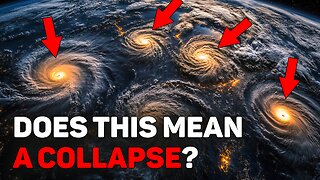Premium Only Content

Tragedy in Spain: City Submerged in 10 Minutes!
Perhaps you've asked yourself: why do we keep making reviews of climate disasters? No, it’s not to frighten you or boost channel ratings. There's a deeper reason for continually highlighting these events. Today, you’ll find out what it is.
In this video, we’ll cover some serious catastrophes that occurred between October 23 and 29, 2024.
Spain experienced a series of devastating storms over several days, claiming more than 200 lives. In the Valencia region, the disaster took residents by surprise; people were trapped on ground floors and basements, while hundreds were forced to take refuge on rooftops and even in trees. Boats and helicopters were used to evacuate residents.
On October 25, Tropical Cyclone Dana hit the Indian states of Odisha and West Bengal, bringing strong winds, heavy rains, and storm surges.
Typhoon Trami’s floods and landslides affected over 7 million people in the Philippines, with the death toll reaching 111. Nearly a million people had to abandon their homes.
On October 23, rare tornadoes erupted near the town of Kadra in Ras Al Khaimah, UAE, lifting clouds of dust and sand into the air. These twisters were instantly caught on camera, becoming a sensation on social media.
Wild weather swept through much of New Zealand on October 24, with nearly 345 mm of rainfall in Milford Sound Bay within half a day. Heavy rains, landslides, and snowfall closed dozens of highways across the South Island.
Starting October 23, a wave of storms swept through several South American countries.
In central Argentina, heavy rains caused floods in three provinces. In Buenos Aires and its surroundings, nearly 60 mm of rain fell in an hour and a half, while over 300 mm fell in Cordoba in a day, surpassing the October average.
A severe storm also hit Uruguay's inland areas, with Paysandú suffering the most. Floodwaters quickly submerged the city, and hurricane-force winds knocked down trees and damaged rooftops.
Two departments in Paraguay were seriously affected by the storm. Gale-force winds and hail struck the city of Pindoi, causing extensive damage to agriculture — the primary source of income for local residents. A state of emergency was declared in the region. In Brazil, storms hit six states in the south and southeast. In Sinimbu, 130 mm of rain fell within two hours. Torrential rains and hail damaged roads and crops, while about 3 million people were left without power. This was the second major power outage in the country this month due to severe weather.
On October 24, atmospheric pressure dropped to a very low level of about 995 hPa. It’s worth noting that a pressure of 1000 hPa already carries a high storm risk, while even lower levels are rare and often accompanied by severe weather.
The disaster led to eight fatalities, with one person still missing.
So why do we make these reviews?
Our goal is to provide people with accurate information about current events. After watching the “Global Crisis. The Responsibility” forum, you’ll see the bigger picture and learn what to expect in the coming years.
Awareness is the first step to preparedness, especially in unforeseen situations. Hearing this kind of information encourages people to look into climate risks in their area, prepare an emergency bag, and understand how to act during natural disasters. For instance, they'll know that in a flood, one shouldn’t try to save their car or other belongings but instead focus on their safety and the safety of those around them.
Don’t be reassured by news that says, “This has happened before.” Yes, Spain has experienced heavy rains, and the Philippines and China have faced typhoons.
But the serious anomalies we’re seeing now used to occur once in tens or even hundreds of years. Now, such events are happening almost daily, simultaneously affecting multiple regions.
This means any of us could be hit by a disaster at any moment.
Share this information with others. By doing so, you’ll help loved ones be prepared, act appropriately in a crisis, and possibly even save their lives.
-
 13:51
13:51
Creative Society
25 days agoClimate Disasters and the Ocean | The Connection We're Missing
1.2K3 -
 18:38
18:38
VSiNLive
1 day agoProfessional Gambler Steve Fezzik LOVES this UNDERVALUED Point Spread!
65.5K9 -
 LIVE
LIVE
Right Side Broadcasting Network
9 days agoLIVE REPLAY: President Donald J. Trump Keynotes TPUSA’s AmFest 2024 Conference - 12/22/24
11,038 watching -
 4:31
4:31
CoachTY
17 hours ago $13.69 earnedCOINBASE AND DESCI !!!!
58.5K7 -
 10:02
10:02
MichaelBisping
16 hours agoBISPING: "Was FURY ROBBED?!" | Oleksandr Usyk vs Tyson Fury 2 INSTANT REACTION
18.7K8 -
 8:08
8:08
Guns & Gadgets 2nd Amendment News
2 days ago16 States Join Forces To Sue Firearm Manufacturers Out of Business - 1st Target = GLOCK
66.6K62 -
 10:17
10:17
Dermatologist Dr. Dustin Portela
2 days ago $14.76 earnedOlay Cleansing Melts: Dermatologist's Honest Review
103K6 -
 1:02:20
1:02:20
Trumpet Daily
2 days ago $34.12 earnedObama’s Fake World Comes Crashing Down - Trumpet Daily | Dec. 20, 2024
65.9K42 -
 6:29
6:29
BIG NEM
1 day agoCultivating God Mode: Ancient Taoist NoFap Practices
49.9K9 -
 30:53
30:53
Uncommon Sense In Current Times
2 days ago $9.69 earned"Pardon or Peril? How Biden’s Clemency Actions Could Backfire"
66.9K4